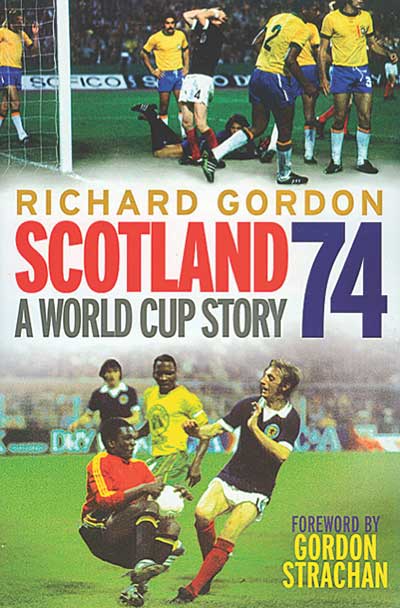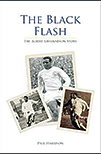Search: ' Billy Bremner'
Stories
With the two teams set to meet again in the FA Cup fourth round this weekend, we looks back at their previous match at Gander Green Lane
 A World Cup story
A World Cup story
by Richard Gordon
Black and White, £11.99
Reviewed by Archie MacGregor
From WSC 332 October 2014
With yet another World Cup having passed Scotland by, the fondness and esteem with which the squad led by Willie Ormond to the finals in West Germany all of 40 years ago are regarded seems to grow ever warmer. Not without some justification either, as although they were unable to progress beyond a group featuring holders Brazil, Yugoslavia and Zaire, they emerged unbeaten, something not even West Germany as eventual winners could lay claim to. Nothing captured this particular glorious failure more enduringly than the image of Billy Bremner clutching his head in his hands as he came within a bobbled ricochet of earning the Scots what would have been a dream-like, yet arguably deserved, victory over the Brazilians.
As nostalgia trips go it makes for an engaging story and Richard Gordon, the respected voice of BBC Radio Scotland’s football coverage for many years, covers it in sure-footed and enjoyable fashion, relying heavily on a mix of interviews with surviving members of Ormond’s 22-man squad and contemporary press coverage. Perhaps the most remarkable aspect of the entire 1974 campaign from qualification to its agonising denouement in the final match against Yugoslavia is just how shambolic Scotland’s preparations had been on and off the field. While it was nothing compared the apocalyptic meltdown that was to come along four years later under Ally MacLeod in Argentina, this Scottish side and their entourage pretty much lived up to something of a Spinal Tap equivalent of the worst stereotypical behaviour of footballers on tour.
Most notorious was the Jimmy Johnstone “lost at sea” rowing boat incident at the squad’s Largs training base for the Home Internationals. But this was just one ill-starred tale among many of broken curfews, boozing, disputes over commercial deals and rumours of team selections being not solely the preserve of the manager. Ironically it was probably Johnstone who had more reason than anyone to emerge with a sense of grievance from the maelstrom, as having apparently been forgiven by Ormond for his boating misdemeanour and yet another breach of discipline prior to a warm-up game in Oslo, he did not feature in any of the three group matches despite still being near the peak of his powers.
While saluting Scotland’s valiant playing endeavours the theme of self-destruction just keeps on recurring. Depending on who you believe, the players either had a misplaced sense that victory alone over Zaire in the opening game was sufficient or they wanted to conserve their energy for the big one against Brazil. Either way it never looked like being enough, but there was to be a final unkind twist as their fate was sealed by an unfortunate fumble by Zairian goalkeeper Robert Kazadi which gifted the Brazilians a decisive third goal in the final round of group matches.
As the book reminds us there was however to be one lasting consolation for the players – uniquely among all of Scotland’s squads to have participated in a World Cup finals they actually got a welcoming party when they arrived back at Glasgow airport.
 The Albert Johanneson story
The Albert Johanneson story
by Paul Harrison
Vertical, £15.99
Reviewed by Ashley Clark
From WSC 306 August 2012
Paul Harrison’s The Black Flash attempts, through a combination of autobiography, oral history and the author’s own observation, to unspool the tragic tale of Albert Johanneson. The South African-born Leeds United forward endured racism on and off the field, became the first black footballer to play in an FA Cup final (in 1965), and eventually succumbed to alcoholism and an early death in 1995.
The meat of this frequently depressing but compelling book is comprised of large chunks of unexpurgated testimony from Johanneson, framed by explanatory passages from Harrison. It is at its best when its subject’s voice is at the forefront.
Johanneson, looking back on his life following the collapse of his career, paints a vividly evocative picture of his youth in a divided South Africa, where racist violence was commonplace and police were viewed as little more than “paid killers”.
Johanneson was scouted and offered the opportunity to play in England but as soon as he stepped off the plane he was branded a “nigger” by a passerby at London Airport. Though team-mates Billy Bremner and Grenville Hair looked out for him, and he found a friend in fellow black South African Gerry Francis, the impression is of a lonely, shy soul thrown to the wolves.
It is harrowing to read about the constant abuse Johanneson received. It is not difficult to imagine how the deep psychological scars from this continued mistreatment might have contributed to his eventual fate.
Though Harrison is clearly reluctant to demonise his Leeds heroes – including Don Revie, who comes across as a cold bully – The Black Flash paints a grim picture of a wider footballing community who hadn’t the first idea how to engage seriously with the pressures faced by Johanneson.
Sadly, the book is beset by structural problems. Harrison is inclined to interject with his own largely irrelevant opinions on the state of modern football and subjects such as political correctness. Key elements of Johanneson’s experience (his marriage, divorce, descent into alcoholism and early death) are sprinted through in a matter of mere pages toward the book’s conclusion.
Though obtaining information must have been difficult – Johanneson was essentially a homeless drunk by the time of his death – and the man’s wishes not to discuss his family should be respected, the book feels as though it is missing a sizeable, vital element.
There is also a conspicuous lack of attention to detail. In one particularly flagrant case, a significant passage of Johanneson’s testimony is repeated twice within the space of 16 pages. The Black Flash feels like it has missed out on a final edit.
Despite its flaws, the books is a worthwhile, instructive and often shocking read, especially in the context of a challenging year for football, when racism has once again made headlines. Harrison’s decency and commitment shine through in a tale that adds flesh to the bones of the story of a key figure in British football history – a man who slipped through the cracks, but helped to pave the way for future black footballers.
 A controversial exit from Celtic has angered the Scottish club, but Graham Davidson asks if they have the right to feel aggrieved
A controversial exit from Celtic has angered the Scottish club, but Graham Davidson asks if they have the right to feel aggrieved
It has never been unusual for Scottish players to move south at an early age. Denis Law and Billy Bremner never kicked a ball in club football at home, while more recently Darren Fletcher arrived in Manchester before he was a teenager. None of these moves, however, generated the publicity recently given to Islam Feruz’s decision to move from Celtic to Chelsea.